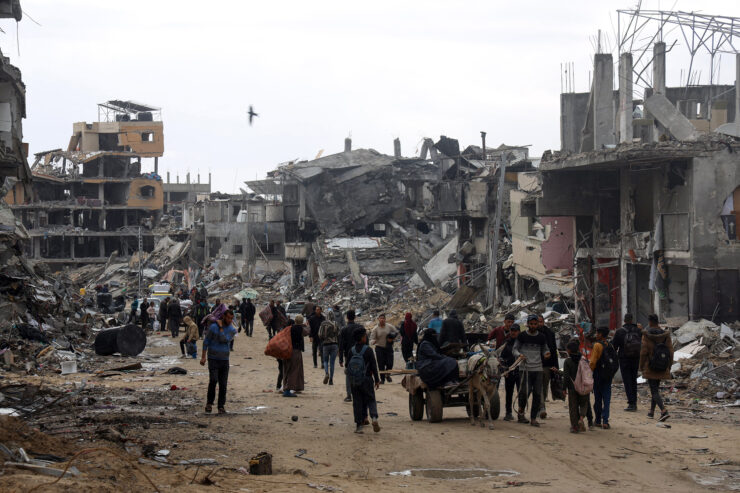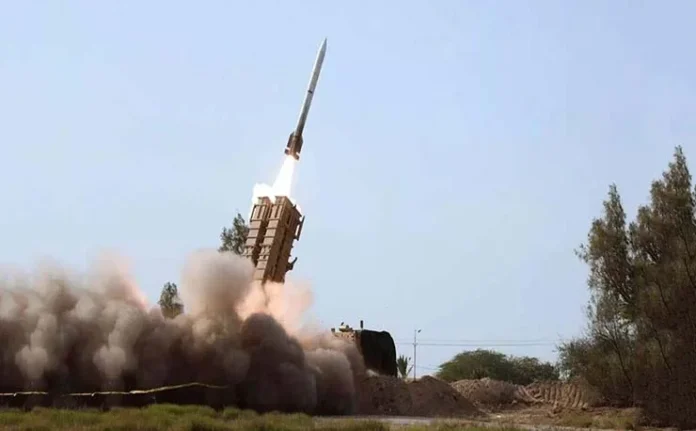In the early hours of April 19, 2024 Israel’s missiles and drones struck into Iran, something that PM Netanyahu and his government had promised after Iranian salvo of over 300 missiles and drones attacked targets inside Israel on April 13, 2024.
It may be recalled that Iran’s strike into Israel was a retaliatory response to the earlier Israeli strike on April 1, which had targeted the Iranian Consulate in Damascus resulting in the death of seven members of the Islamic Revolutionary Guard Corps (IRGC) including General Mohammad Reza Zahedi, the senior most commander in Lebanon and Syria. Iran had vowed revenge for the attack on its sovereign territory, ‘the consulate building’.
Initial inputs on April 19 reported loud explosions in the vicinity of the city of Isfahan, but soon it was clear it was nothing significant and that the Iranian air defences had shot down ‘three drones’ over the skies of the city. Although some media outlets later presented satellite pictures to show that some part of the Air Defence Battery in Isfahan was damaged, but neither Iran, Israel nor the US were ready to comment anything on it.
Unlike Iranian strikes into Israel, where several missiles had penetrated through the air defence and caused damage at closely protected air bases in Nevatim and Ramon, none of the suspected Israel’s drones caused any damage in Iran
The city of Isfahan is important because of the location of critical nuclear plants and air bases of the Iranian air force. Iranian media was prompt in dismissing the attempted strike as a complete failure while Israel maintained stoic silence, nether confirming nor denying the strike. Iran’s establishment too dismissed the attacks as ridiculous, adding that such failed attempts do not deserve any response. Israel’s National Security Minister Itamar Ben Gvir was critical of his own government’s action, commenting on X with a simple comment ‘lame’.
Unlike Iranian strikes into Israel, where several missiles had penetrated through the air defence and caused damage at closely protected air bases in Nevatim and Ramon, none of the suspected Israel’s drones caused any damage in Iran.
This may have been a dampener for Israel wanting to cause at least some token damage in Iran, but it sure saved the day for the region as Iran said that there was no need to respond since nothing had happened on Iranian soil. Just a day ago, Iran’s Foreign Minister Hossein Amir-Abdollahian, speaking to CNN, had said that if Israel again took actions against Iran, “the next response from us will be immediate and at a maximum level”.
The US has gone on record to state that it won’t support Israel in any offensive action against Iran, it does not want to get involved in any conflict in the region and it does not seek war with Iran
While all this was happening, the UN Security Council was busy voting on the Palestinian request for full UN membership. The US showing full allegiance to Israel, vetoed the request almost at the same time that Israel was perhaps launching the strike into Iran.
Will Israel and Iran Call it quits?
Now that Israel has apparently taken its revenge, the world is asking both Iran and Israel to call it even and quit targeting each other to avoid escalating the Gaza conflict into a larger regional war. Question now is whether both will actually heed to the advice and call it quits?
For Iran, presently there is no need to escalate further as its strike on April 13 found the mark as a mark of revenge for the Damascus strike. However, for Israel, it is different. It was attacked by more than 300 aerial military platforms originating from Iran and something that Tehran acknowledged publically.
It took the combined efforts of its entire air and anti-missile defences combined with efforts of Jordan, the US, UK and possibly Saudi Arabia to foil it and then too, some missiles found their mark on its air bases. In return, the suspected Israeli attack on April 19 ended as a damp squib.
For PM Netanyahu, who had promised severe retribution against Iran in the past few weeks, it is difficult to sell it as a successful revenge. He seems to be stuck in a ‘no win’ situation. In case, he does decide to strike harder again, there is a possibility of severe payback from Iran and its allies (proxies) in the region.
Also, not to forget, the US has gone on record to state that it won’t support Israel in any offensive action against Iran, it does not want to get involved in any conflict in the region and it does not seek war with Iran. Without active military support from the US, Israel does not have the necessary military means to strike and succeed against Iran located 1,700 kms away.
On the other hand, Iran is a much larger country and thus has much more capacity to absorb strikes and damages. It also possesses the largest and most potent ballistic missiles program in the region, with missile ranges that can easily cover Israel.
Iran has developed hypersonic missiles too, which fly at speeds of Mach 5 and are beyond the interception capability of most anti-missile systems. Russia has used such missiles in its war against Ukraine with great success
In addition, Iran has developed hypersonic missiles too, which fly at speeds of Mach 5 and are beyond the interception capability of most anti-missile systems. Russia has used such missiles in its war against Ukraine with great success. Iran also has cruise missiles with ranges of up to 3,000 kms.
A number of its missiles can easily reach and target Israel, something that it has demonstrated on April 13, already. Reports of Russia soon delivering two squadrons of Su-35 4.5th generation multi-role fighter aircrafts to Iran will only add to the military teeth of Iran.
Iran also possesses a large variety of drones too. Iran has, in fact, mastered the art and science of developing low cost and low technology drones which are revolutionising the battlefields. It has been exporting its drones to Russia too, where they are being effectively used against Ukraine. Its Shahed Missiles, which are suicide or Kamakazi missiles too, have been used effectively during the on-going war.
Plus, Iran has the advantage of using its proxies which are equipped and funded by it and are operating right across Israel’s borders. There are reports that Iran is also raising a new resistance force in Jordan. With all this at Iran’s disposal, the balance is clearly tilted in favour of Iran in case of a direct military escalation with Israel.
Also, in a significant change of policy having major regional security repercussion, Iran has declared the end of its ‘strategic patience’ after its attacks on Israel on April 13. Mohammed Jamshidi, Political Advisor to Iran’s President declared that the “the era of strategic patience is over” and that any Israeli assaults will be met with a “direct” response.
Warning Israel, Iran’s President too had issued a statement, “If the Zionist regime (Israel) or its supporters demonstrate reckless behaviour, they will receive a decisive and much stronger response”.
Israel is therefore better served with no further direct escalation with Iran. Instead, it should focus on keeping the Gaza war localised and ending it soon with a sense of victory, and not a stalemate.

Ceasefire in Gaza
If Israel and Iran call it quits, at least for the time being, the focus then reverts back to continuing efforts to get a permanent ceasefire in Gaza. Despite a UN Security Council resolution of March 25, calling for immediate ceasefire and unconditional release of hostages, no common ground has yet been found between Hamas and Israel.
Iran also has the advantage of using its proxies, equipped and funded by it and operating right across Israel’s borders. There are reports that Iran is also raising a new resistance force in Jordan
Plus, continued Israeli strikes into Gaza, especially on aid convoys and hospitals are making matters worse. An Israeli attack in northern Gaza which killed three sons of Hamas chief Ismail Haniyeh on April 10, on the eve of the festival of Eid, may also force Hamas to take a hardened position in future negotiations.
Here too, Israel faces an uphill task. Netanyahu has not yet been able to achieve any of his war objectives in the Gaza war. The 135 Israeli hostages in the custody of Hamas have not yet been released, Hamas has not been eliminated and Yayha Sinwar, the Hamas leader responsible for October 7, terror attack into Israel, continues to evade Israeli intelligence.
On the other hand, Israeli forces have suffered significant losses in the past six months and it is now having an effect on the war fighting capacity of the IDF. Probably owing to this factor, Israel withdrew all its forces (less one brigade) from Gaza on April 7, moving most of its formations northwards in anticipation of Iran’s retaliation.
The Rafah offensive has been put on hold after the US drew a ‘red line’ against it. Leaked reports of Israel aiming to build settlements in Gaza after the war, too does not help in the efforts of seeking a ceasefire. Also, news of Maj Gen Aharon Haliva, the head of Israeli military intelligence, resigning from his position on April 22, taking responsibility for the October 7 Hamas attack, adds pressure on IDF.
What Next?
The Gaza war is well into its seventh month now and has been the longest that Israel has been engaged in, ever since it vacated Gaza in 2005. Every day of fighting is dragging Israel down politically and economically.
Israel’s strike against Iran on April 19, seems to have provided Israel the face saving, as it has settled the scores with Iran, at least for now, although Iran can smile and quietly sell it as a victory
The global narrative too has been pitched strongly against Israel. Though it was thought that Iran’s strike into Israel would help turn it around doesn’t seem to be happening. Israel has to therefore critically review its war objectives in Gaza.
Release of hostages should be its top priority and if that means vacating Gaza and agreeing to a ceasefire, it should take it. There will always be another day when Israel can do what it has not been able to do this time. Not all battles are meant to be won, not at the cost of larger strategic goals.
Israel’s strike against Iran on April 19, seems to have provided Israel the face saving, as it has settled the scores with Iran, at least for now, although Iran can smile and quietly sell it as a victory.
Learning perhaps from the history of Iran’s remarkable restraint and astute regional strategy, Israel can, for once, exercise strategic patience and wait for its chance.
-The writer is an army veteran, a research scholar and analyst on international relations and Assistant Director at MP-IDSA, New Delhi.
The writer is a military veteran and a West Asia Expert. During his service, he has been a Director of Military intelligence and Director of the Ministry of Externa Affairs. His X Handle is @rajeev1421. The views expressed are personal and do not necessarily carry the views of Raksha Anirveda














